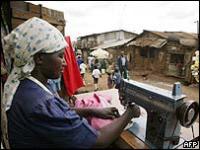







|
News and Information
African growth at eight-year high
| May 18, 2005 |

Africa's economy grew last year, but can growth be sustained?
African economies grew more than 5% in 2004, their highest growth in eight years, spurred by high commodity prices, a report has said.
The African Economic Outlook, produced by the OECD Development Centre and the African Development Bank, praised "steadily prudent economic policies".
But it pointed out that Africa was still vulnerable to regional conflicts.
And it called for more debt relief, action against corruption and support for small businesses.
Oil boost
Growth in the region benefited from new oilfields coming on stream in Angola, Chad and Equatorial Guinea.
Central Africa saw a 14.4% rise in growth in 2004 due to the expansion of its oil production capacity.
East Africa grew by 6.8%, while West Africa grew by just half that amount, 3.4%.
Greater political stability in some countries and a significant rise in official development aid to Africa helped foster growth.
African agricultural production also took a turn for the better after the ending of the drought of 2003, which hit Ethiopia, Malawi and Rwanda.
However, the OECD and the African Development Bank expect average African growth to be a little slower next year as no new oil fields will be coming on stream in Central Africa.
The report also highlighted the humanitarian crisis in the Darfur region in Sudan, economic collapse in Zimbabwe and conflicts in Ivory Coast and parts of the Democratic Republic of Congo as factors constraining growth.
Missing middle
The report highlighted what it calls the "missing middle", the shortage of small and medium-sized businesses (SMEs).
Outside of North Africa, Mauritius and South Africa, successful businesses tend to be either very small, such as cooked food sellers, hairdressers and tailors, or very large, such as oil companies or multinationals.
Lack of access to affordable bank loans and credit is the biggest obstacle to the development of African SMEs, the report found.
Leasing, franchising and credit-guarantee schemes can all help small businesses avail of credit, it said.
Too much regulation is also a problem, the report found
While it takes just two weeks to set up a business in Morocco, it can take five months in Angola.
Other obstacles to setting up SMEs include political unrest and the lack of such basic services as electricity and water.
The report was launched in Abuja, Nigeria, at the African Development Bank meetin |
Source: www.bbc.com |
| http://news.bbc.co.uk/2/hi/business/4558213.stm |
|
| Support Caprivi Freedom |
Fill out the form below to become a member of this site and receive our regular newsletter.
|

|

